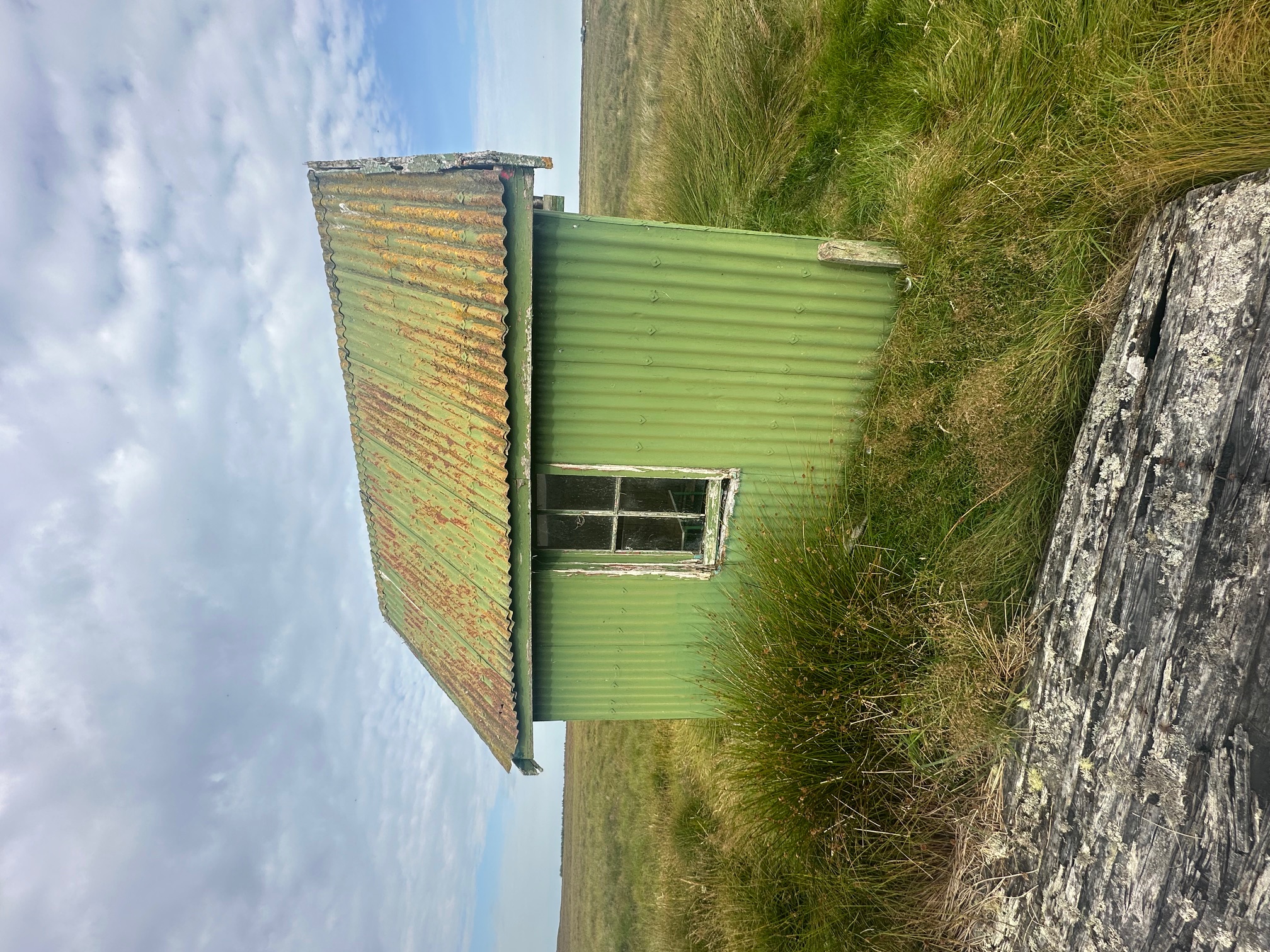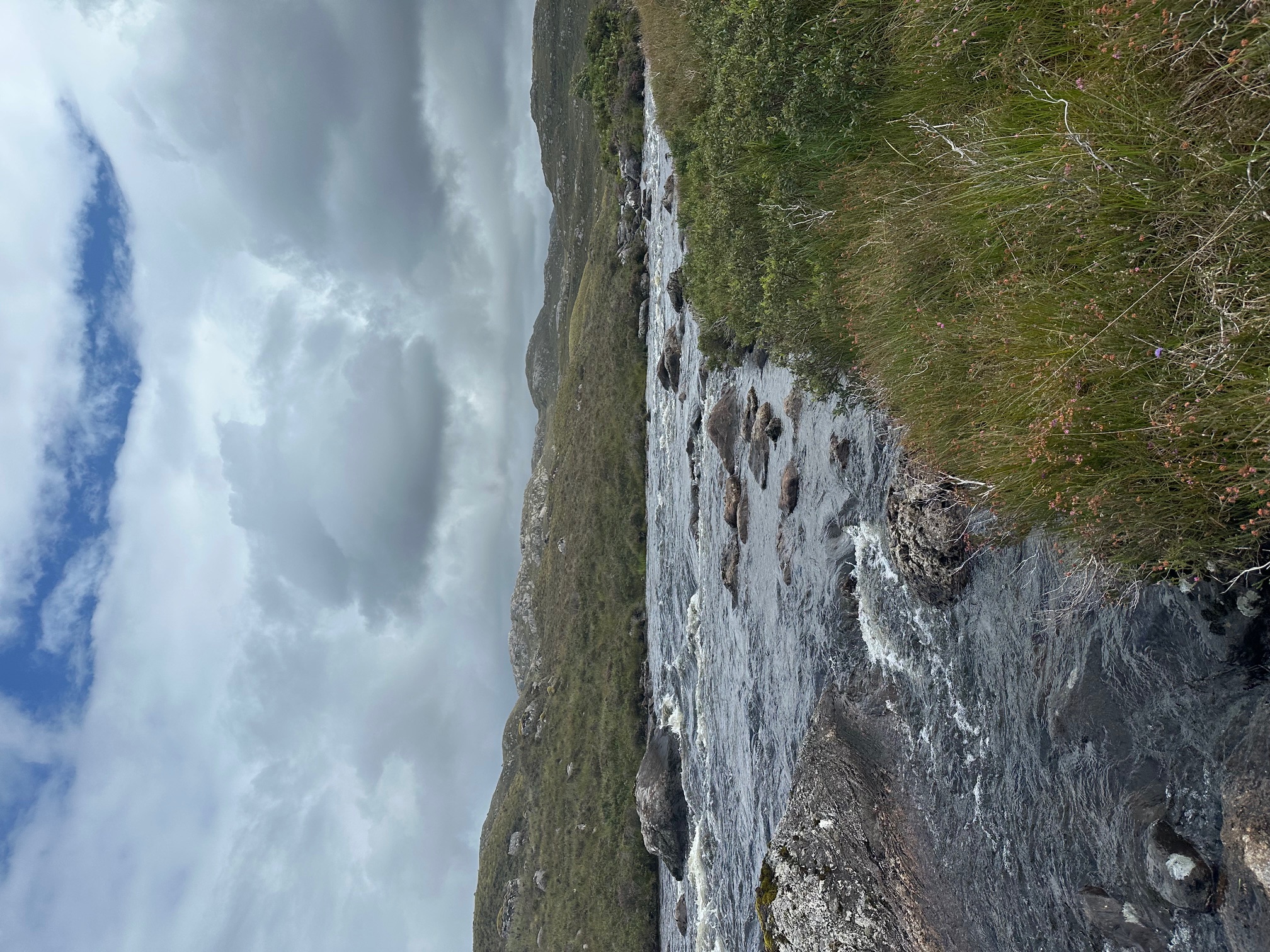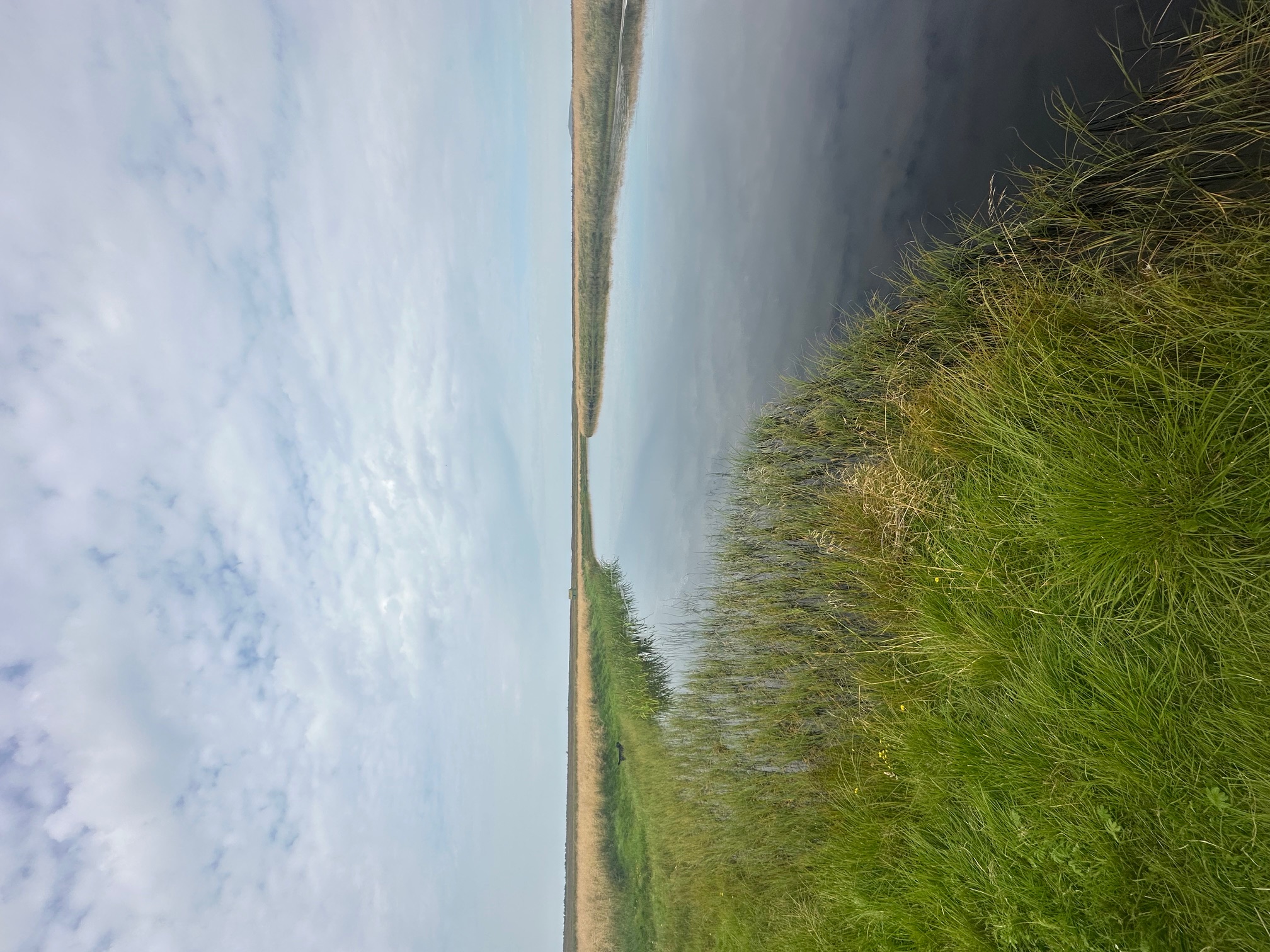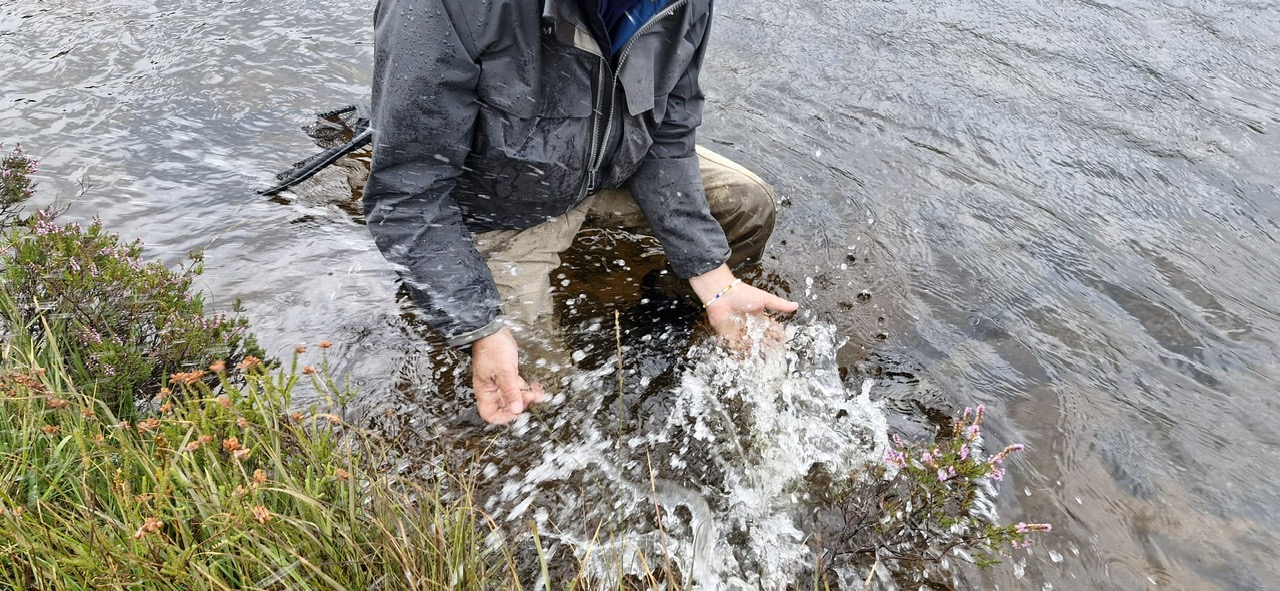
the Victorian green fishing hut on the river Thurso
Preparation
The family is away, far away, all the way across the Atlantic way—the annual pilgrimage to the in-laws. I am deemed too outdoors and backyard to share the stay, left to kick my heels. It is a hot August, and I know how John McNab felt, or rather his creator, John Buchan; ‘ennui’ would be pushing it, but I do need a distraction to slap any listlessness on the head. Forget Heathrow, queues, liquids, and scanners – head North, old man. Chuck everything, and I mean everything, in the car.
Gone are the days when I hurled a Tesco’s placcy bag with a toothbrush and a pair of pants somewhere in the back of the car, anywhere – if it got misplaced, so be it. Indeed, I now have an agenda, a printed itinerary, I admit – its laminated in large bold font with postcodes, mobile numbers, and downloaded podcasts to keep me sparky through the average speed time warps. A collection of something fishy -The Last Salmon (Jim Murray), Countryslide & The Wildfood People, (Rich Prideaux), Skinners Countryside, and then political/business – Diary of a CEO and Political Currency. Well, placed Cadbury’s, crème caramels, and Jimmy’s iced coffee, and I am raring to go.
Rods and lines for spate rivers, canal sections, lochs, and big river floods, along with 10,000 flies, should do the job, which will allow me to whittle it down to one rod and two or three flies. However, it is a huge relief knowing I have a choice, along with 50 shades of gilets.
After an early night, I am woken by the grating, jarring, piercing, and yes, really whining screech of the garden’s single ‘spoilt ‘buzzard fledgling.
“Kee-ah, kee-ah, kee-ah” and on and on it goes. This is not the gentle, sometimes soporific ‘mewing’ of an adult buzzard. The poor parents are nowhere near the nest, sat hunched three hundred yards away from this plaintive begging—a demand for food. I am not so lucky.
To make absolute certainty, I will not drop back to sleep, a green woodpecker rocks up on the larch tree with its wild echoing laugh, the ’yaffle’. He can jubilantly mock the buzzard, a wild, echoing laugh, something like a hurried “ klu, klu, klu, klu “ spat out from the trees.
Is there a witch cackling in the garden, a woodland spirit? In folklore, the green woodpecker was said to have betrayed a secret and was cursed forevermore to hammer on trees, laughing at its own fate. It appears to be laughing at me for still being in bed, but it will vanish as soon as I poke my head out of the window – that will be the ‘spirit’ bit.
Outward bound
Would the A9 Sassenach toll road in Scotland be kind to me? After all, my Defender is approaching four years old. Or would I have a massive “Nick me” target on my Southerly plates? I convinced myself that stopping at John Norris in Penrith would make the Gods look down kindly on me, but then popping into the House of Bruar probably ruined the karma.
There comes a point where the amber petrol warning light can no longer be ignored, and besides, I need a pee. Welcome to the realisation of how much biomass we, humanity, have created. The sweet, intoxicating smell of service station urine where a thousand souls release the pent-up waste of bio-abundance. Pints of the stuff poured over the single-use plastic splash guards tossed into each bowl. I assume they are single use? Some Prof with a PhD in physics designing them with a child’s spirograph. ‘Now wash your hands’
West Coast Spate River

The river tumbled seawards for ten miles with not even a goat path to help your descent
I followed the bright stream down to the sea, not even a goat path to help our descent.
White horses break the bay – the aftermath of Storm Floris, in turn broken by the wing-born plumes of water, shattered by gannets spearing mackerel. In the distance, the Summer Isles bring perspective to the place. After seven hours, I am here at the mouth of a little spate river, where it opens its heart to migratory salmon and sea trout, weary-kneed and drunk with the delight of fast running, fast taking salmon climbing its rocky waters. Not even a goat path to help our descent, we scrambled around and across boulders with just a fly line for company, and happy fish.
The storm brought this river alive, but is a river alive? A trending question thanks to Robert MacFarlane’s recent book of the same name. It may seem far-fetched, and has only recently become a question. They had always watered our lands, brought protein in from the sea, and hosted a web of creatures below and above the watermark.
Giving a river legal personhood means the law recognises it as a rights-holder, like a company or an individual– a right to flow unencumbered, free from pollution, and represented by appointed guardians to protect it from harm.
I leave this ‘live river’ with its oxygen pumping from a million trickles through the sphagnum moss and a trillion raindrops off the Atlantic
North Coast

Dare to touch this water, and all the eyes below will see you
I am still pondering this thought two days later as I fish the River Thurso, winding across the flat meadows of Caithness. Is it alive? We give it live expressions, it’s on its knees, down to its bare bones, and so it is.
Being very north, the air has a fresher breeze – just geography, but there are subtler differences – starlings sing from the chimney pots – you don’t see that much in the south any more. Perhaps it’s the crane flies in the pasture – the permanence of the pasture, the permanence of time we have lost. I like it. Those glossy colloquial gossips, destined to be our neighbours, until we kicked them out. We didn’t raise their rent; we just made a different world for ourselves and never gave them a second thought: new, denser perennial rye and fescue grasses, regularly doused to banish moss and worm casts. For what? To replace a glossy songster on the chimney for a green lawn – well, that’s my theory.
Twenty-five swifts scream above the starlings, on the rooftops, and the telephone wires are heavy with tens of swallows, prepping for the long slog South. Every few yards along the single track, meadow pipits flit into the heather, a sparrowhawk watches from a fence post, and a young short-eared owl begs for food like the southern buzzard.
The difference here is simple: Insects – we should have a Royal Society for the Protection of Insects (RSPI). Would we then need the RSPB?
The sand martins accompany my casting, relying on the river to carve fresh steep banks of clay, where each spring they tunnel homes of darkness to hide their treasured eggs. No river, no martins, and no me standing in my waders, wondering about those little black holes dotting the bank, while I curse the high temperatures sending the fish into a lethargic sulk pressed to the riverbed.
Not wishing to add to the stress of the heat, stripping the water of its oxygen, I put my rod aside.
East coast
I drive south, the East coast to my left, crossing the Helmsdale and the Bogie, all the time the North Sea shimmers like the Med as the hot weather plume moves North. There is chatter about rain. Once South of Inverness, the distant, mighty Cairngorms, clothed in their summer purple, lie enfeebled by the darkening mass of brooding weather, the hills pushing the cloud higher, to breaking point, spill point as the car’s headlights automatically react to the gloom. Will the rain bring respite? Have I got my timing right?
The next morning in Banchory, the evening’s localised thunderstorm has raised the river Dee by five inches. Where the river Feugh enters the main stem, there is a clear demarcation between clear but slightly peat-stained water and the muddy main river. My chance? But within a few hours, everything is back to low water levels, the sun shines bright, and water temperatures rise again. The dog walkers arrive, and everyone wants to throw everything they can find into the water, finally concluding with themselves, both man and beast.
Not wishing to add to the stress of the heat, stripping the water of its oxygen, and the shock tremors which must be pulsating through the pool, I put my rod aside.
Retreating to the cool solace of the fishing hut feels the natural course. On the way, I draw in the scent of freshly strimmed grass, now sweetening into hay, and relish the sugar burst of blackberries.
The ghillie, the owner, a surgeon from Hull, an American from Idaho, and myself, content with our retreat into history – yet more troubling than the graffiti on the bridge or the discarded dog shit bags a curious detachment from those around us outside. That does not bode well
Homeward bound
Back on the motorway, heading southbound. Sat nav says ETA 19:00. The constantly changing speed limits irk me. Three days earlier, it was tourists jamming on the brakes to see some Highland cattle in a field: now it’s cars sitting on my bumper adding to my water-whipped weariness.
I miss the remoteness, the wildness, and the solitude already.
I wonder what the political reformer, journalist, and agriculturist William Cobbet, best known for his book Rural Rides would have thought?

How it should be! Fast release in cold, clean water